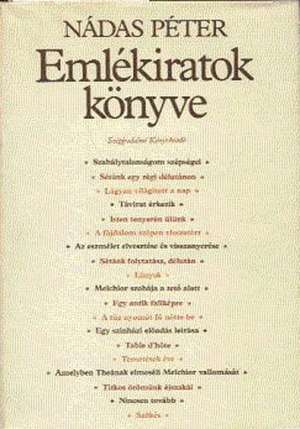A Book of Memories
A Book of Memories (Hungarian: Emlékiratok könyve) is a 1986 novel by the Hungarian writer Péter Nádas. The narrative follows a Hungarian novelist involved in a romantic triangle in East Berlin; interwoven with the main story are sections of a novel the main character is writing, about a German novelist at the turn of the century.
 | |
| Author | Péter Nádas |
|---|---|
| Original title | Emlékiratok könyve |
| Translator | Ivan Sanders Imre Goldstein |
| Country | Hungary |
| Language | Hungarian |
| Publisher | Szépirodalmi Könyvkiadó |
Publication date | 1986 |
Published in English | 1997 |
| Pages | 534 |
| ISBN | 978-963-15-3232-6 |
An English translation by Ivan Sanders and Imre Goldstein was published in 1997 through Farrar, Straus and Giroux.[1] The novel won the French Prix du Meilleur Livre Étranger in 1998.[2]
Reception

Under the headline "The Soul of Proust Under Socialism", Eva Hoffman reviewed the book for The New York Times. She wrote that "in A Book of Memories, Peter Nadas ... has accomplished a remarkably interesting feat: he has transposed the novel of consciousness to the Socialist universe, and closed the gap between prewar modernism (inflected here by post-modern psychoanalysis) and Eastern Europe." Hoffman wrote that the novel has a style of details in "magnified, hot close-up", and that "Longueurs can have their plaisirs, as we know from Proust; but some passages in A Book of Memories are drawn out to the point of tedium or silliness, and the novel within the novel is marred by occasional affectation. Still, these are minor flaws in a work that offers a lot of incidental as well as major pleasures: quirky chapter titles, in the manner of Robert Musil ("A Telegram Arrives" and "Slowly the Pain Returned"); an astonishing scene in which two boys help a sow deliver her litter; a rare honesty about the conflicts of homosexual romance; and the colloquial freshness of the language."[1]
The American literary theorist Susan Sontag called A Book of Memories "the greatest novel written in our time, and one of the great books of the century."[3]
See also
References
- Hoffman, Eva (1997-07-27). "The Soul of Proust Under Socialism". The New York Times. Retrieved 2011-11-03.
- Staff writer. "Peter Nadas". evene.fr. Retrieved 2011-11-03.
- Kimmelman, Michael (2007-11-01). "A Writer Who Always Sees History in the Present Tense". The New York Times. Archived from the original on June 5, 2015. Retrieved 2011-11-27.